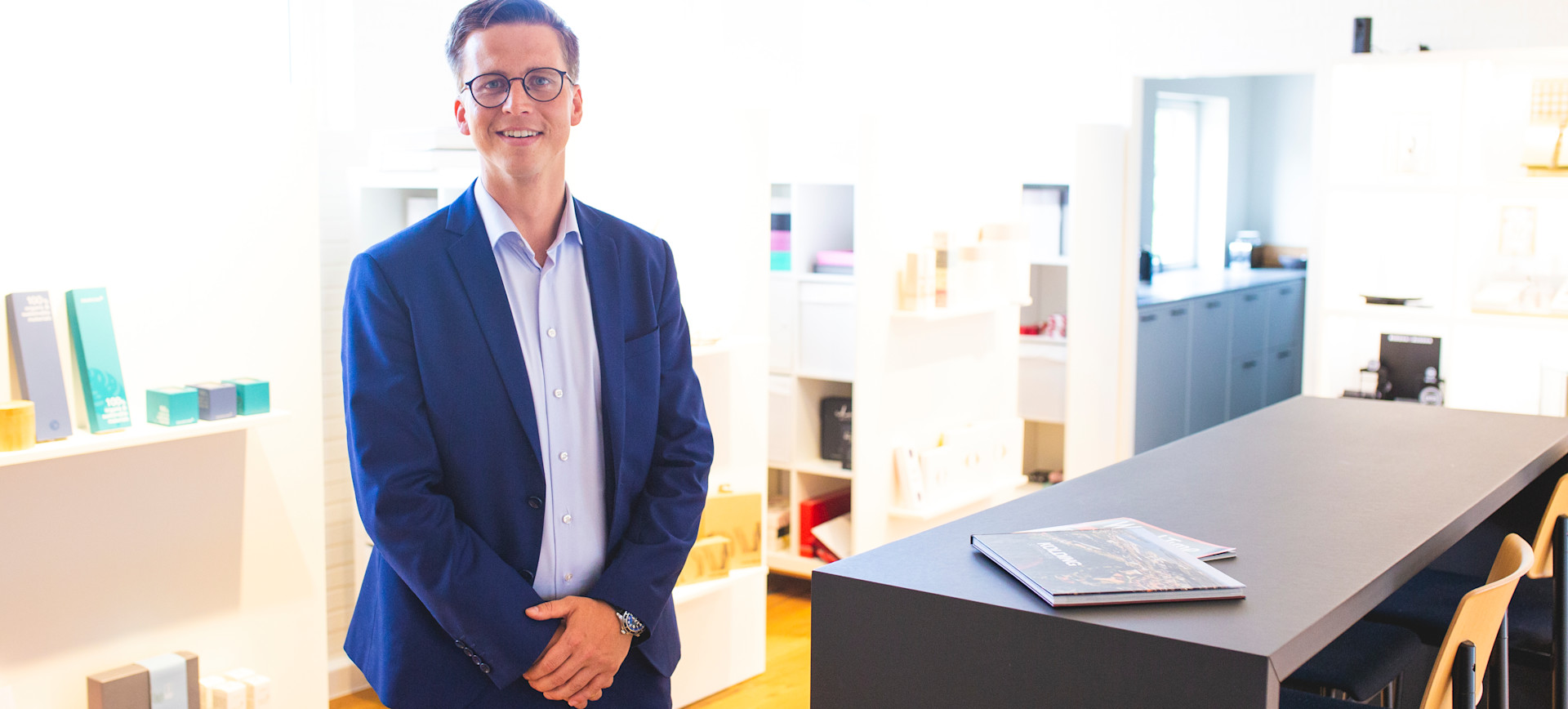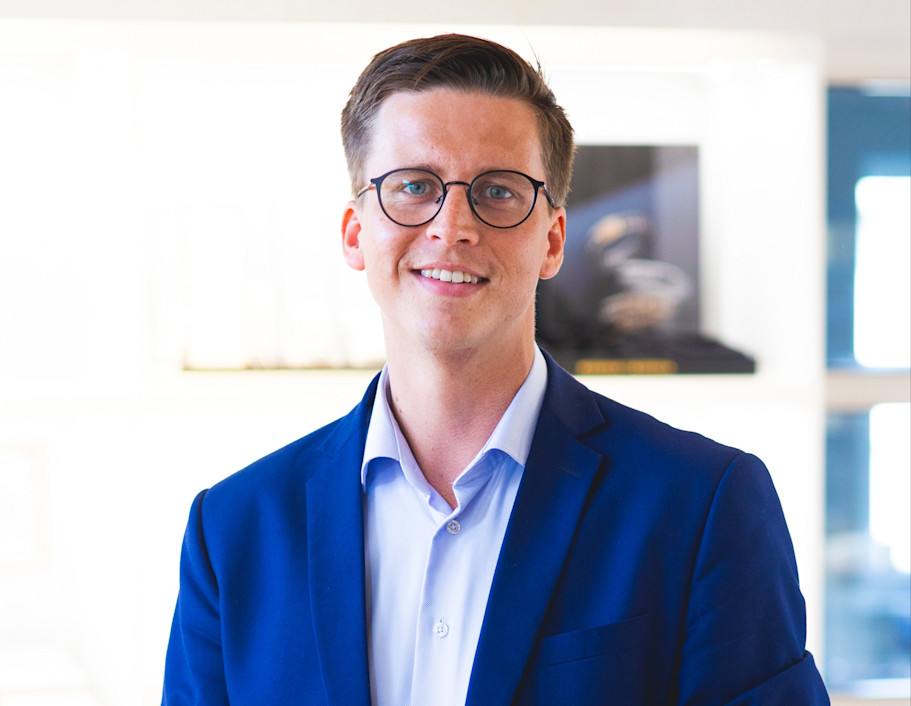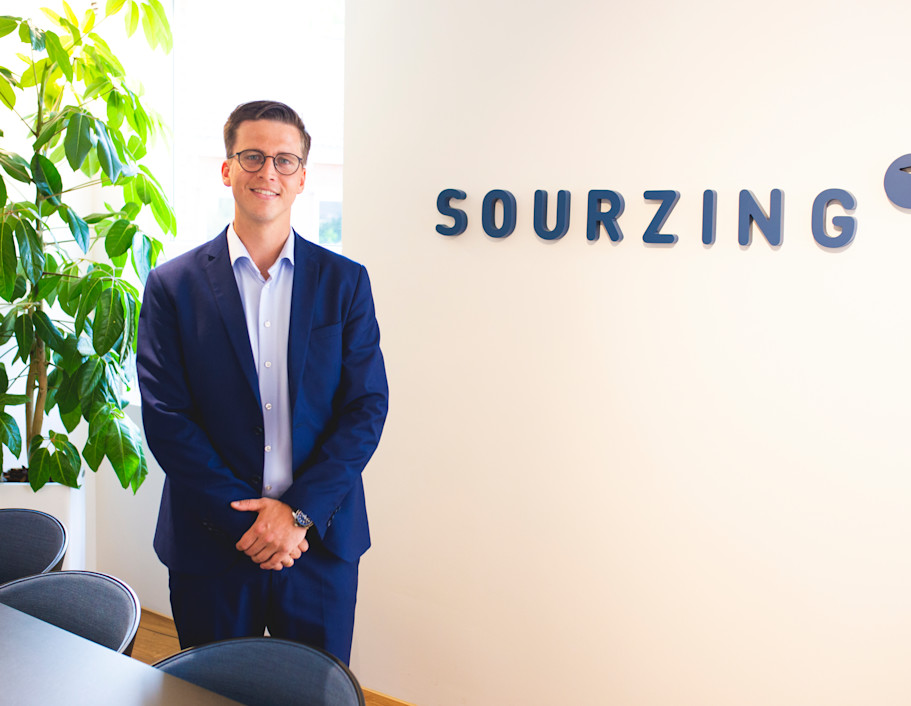
Created 10 May 2023
"My career started when I was admitted to my education."
The process of job searching can seem like a daunting task. Where do you start? What are your skills? How do you convince people that you're the one who should get the job?
Campus Kolding has interviewed a former student and asked him to share how students can kickstart their careers during their time at university. Read Simon Juel Bundgaard's journey from student jobs to a career.

Tell us about your career path
My career journey started when I was admitted to my education. At that time, I was aware that I would spend the next three to five years of my life building the best foundation for a job after completing my education. Through my studies, I could acquire a lot of knowledge in a specific field. However, I quickly realized that knowledge is valuable only if you can apply it in practice. Additionally, a study program doesn't train you in versatile and social skills, which are also crucial if you want to stand out from the crowd. That's why I chose to prioritize time and energy in various activities alongside my studies, including part-time jobs, internships, study abroad programs in China and Spain, starting my own business, earning extra ECTS credits, volunteering, serving on boards, tutoring, and more. All of these endeavors were aimed at gaining knowledge, gaining experience, and developing skills that I believed would make me stronger after my education.
As I approached the end of my education, I began considering my job opportunities. In connection with my master's thesis, my thesis partner and I had a case interview with the director of Sourzing A/S, an international company that provides customized exclusive packaging and Point of Sale (POS) solutions to global watch and jewelry brands. They have their headquarters in Kolding, Denmark, and additional offices in Hamburg, China (Wenzhou and Dongguan), and Singapore.
After the interview, I was very determined to join the international growth journey that Sourzing A/S was embarking on. Therefore, I wrote an unsolicited application to the director to discuss the possibilities of a future collaboration. Since the company had not advertised a position, it was a collective task to define the framework and responsibilities for a potential job. At that time, the company was facing several exciting development projects where they needed someone to handle these projects. I convinced the management that I was the right person for the job, and I subsequently started as a Business Development Manager.
In my role as a Business Development Manager, I primarily work on development tasks related to market development, digitization, sustainability, strategy, communication, branding, and more. For this purpose, I closely collaborate with all functions, primarily the management and the board.
To mention a specific task, I am the project leader for our digitalization efforts, where we are implementing a scalable digital company platform. This platform aims to streamline workflows, reduce product development time, and enhance the customer experience, among other things. Additionally, I am also the coordinator for a sustainability project, where we collaborate with Deloitte and Business House South Jutland to develop a strategy and action plan to strengthen our sustainable solutions in line with the United Nations' 17 Sustainable Development Goals.
“A degree doesn't train you in versatile and social skills, which are crucial if you want to stand out. That's why I chose to prioritize a lot of activities alongside my studies.”

Is there a match between your education and job?
There is definitely a match between my education and my job. I feel incredibly privileged because I have the opportunity to work within the areas that I'm truly passionate about. In my job, there is also a good opportunity to apply theories from my studies. The most valuable aspect of my education that I can utilize is a methodological toolbox consisting of various academic skills that I have acquired through my studies. Additionally, the ability to collaborate with colleagues and other stakeholders on various tasks and projects is also important.
Has geography played a role in where you applied?
Geography has not played a role for me. I have never been limited by geography, and I was also willing to relocate for the right opportunity. However, I had grown very fond of living in Kolding, and I had a strong desire to continue living there if I could find the right match. At the same time, I was aware that there were many exciting job opportunities in the Triangle Region (Trekantområdet).
Why did you choose to study in Kolding?
The primary reason I chose to study in Kolding was because they offered a unique Bachelor's program in Innovation and Entrepreneurship. In addition to my desire to pursue this unique program, which is only offered in Kolding, I also chose to study in Kolding because of the brand-new university, the social study environment across disciplines, the collaboration with the business community in the Triangle Region, and the close contact with the instructors. Furthermore, I was drawn to the fact that it was a smaller university, which seemed more manageable and easy to navigate.
Do you see any advantages in seeking employment in the Triangle Region?
First and foremost, there are many job opportunities in the Triangle Region. According to trekantomraadet.dk, it is home to more than 22,300 companies, and the job opportunities are plentiful and diverse. Moreover, the cities in the Triangle Region are close to each other, and there is good infrastructure. So it is easy to live in one city and work in another. If the dream job is not found in the Triangle Region, Aarhus, Odense, and Esbjerg can be reached in less than an hour. Therefore, it is definitely an advantage to settle in Kolding due to its central location.
What career advice would you give to new students?
Engage in student life and build a valuable network
During your time as a student, you have a great opportunity to expand your network and create valuable relationships. This network is important for you during your studies, but also for your future career. Therefore, my clear advice to you is to engage in student life and participate in activities that may be of interest to you. For example, I have gained many connections from participating in Ubåden and SDU Fodbold (student organizations).
Part-time jobs, internships, and study abroad experiences - check, check, and check.
Whether you find a job related to your studies or not, a part-time job is incredibly valuable for your CV and also for your finances during your studies. Furthermore, an internship is a unique opportunity to test and explore your professional interests in practice. An internship allows you to find out if you are truly passionate about a specific field, which gives you better clarity when seeking full-time employment. Lastly, you should seriously consider the options for studying abroad. It is not only an amazing experience but also an investment in your future career. Seize the opportunity and go for it - you won't regret it.
Done is better than perfect
As a student, I had a tendency to strive for perfection because I wanted to achieve good grades. However, since starting full-time work, I have learned the value of "Done is better than perfect." In a full-time job, there isn't time for everything to be perfect as there are ongoing tasks that need to be completed. Therefore, a piece of advice is to ensure that you focus only on the essentials and stop before seeking perfection. This way, your time is used more effectively, and you will find that you can complete multiple tasks within the time it would normally take to complete one. You can practice this mindset during your time as a student, so you'll be prepared when you kickstart your career.
“After I started working full-time, I learned the value of 'Done is better than perfect.'”